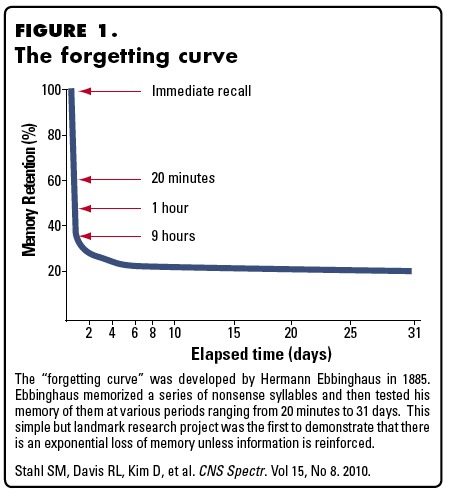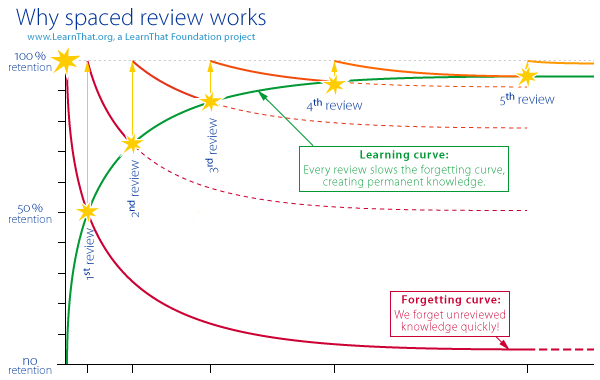The most important and tangible thing you get out of college is your degree, ideally with a high GPA. Some people will find that what worked for them in high school will continue to work for them in college. If so, no need to read the rest of this article.
For others, either they didn’t do well in high school to begin with or they find themselves struggling in college despite performing well in high school. If that’s you, insha’Allah this article will be useful in teaching you how to study.
Before the semester begins
First, make sure you have your books ordered and with you at least two weeks before class begins. Amazon typically has books cheaper than your university bookstore and with Amazon Prime, will often get the books to you within two days of purchase. When your books arrive, flip through them. You don’t need to start studying them just yet but get familiar with the books you’ll be using through the year.
I would strongly recommend sticking with physical books. Studies have demonstrated that students retain less information when reading on a screen and I’ve personally found that I do much better in classes when I have physical books on hand. College books can also be the beginnings of your personal library.
You’ll find a lot of people recommend buying older editions of textbooks to save money. I would not recommend this. Having a businessman’s mindset means knowing when you should be frugal and when you should spend money. This is a place to spend money. You’re in college to learn and making it harder to learn in order to save a few dollars is quite shortsighted. If you do insist on getting an older edition, email the professor before the semester begins and run it by them. Make sure that there definitely isn’t any benefit in the newest edition before getting an older one.
Count how many courses you’re taking and buy a simple 1.5 inch 3-ring binder for each class. Your school likely uses some type of online portal like Blackboard or Moodle. Log on before class starts and print out the syllabus for each class. Hole punch the syllabi and put one inside each binder.
Make sure you’ve put your class schedule into your calendar. Put all exam dates and big papers on your calendar in black. Never, ever, ever be surprised by an exam.If you’re taking a class online, find an open time and schedule it in like a physical class.
While I didn’t do this, some people like to block off specific study time for each class. If you find that you don’t have enough time to study because you’re involved in too many other things, this is a good idea. Block off time to study and make it an event in your calendar like any other activity. That way, you have a dedicated study period that you know from the beginning is time that you can’t spend anywhere else.
During the semester
For any class that has reading assignments, do all the reading for the week on the weekend before they’re due. Not only does this free up time during the week, it lets you get more out of class. Be careful not to fall behind on reading. It’s easy to do and will result in you having to cram right before an exam.
In terms of going to lectures, different people have different thoughts on it. Some are adamant that you should attend every single lecture and never ever skip. I don’t agree with this philosophy. I always attended the first week or two of class to get a feel for the professor. After a few classes, I made the decision whether or not to continue going to lecture. For small classes where attendance is taken, this is not an option. Don’t skip a class where it’s painfully obvious that you’re not there. For large lecture classes, however, I often found that I gained nothing from lecture and that it was just one hour of me sitting bored. Those classes, I stopped attending. Instead, I would go to the campus library during that period and study. I’ve always been more of an independent learner so this worked well for me. It will not work for everyone. And it will not work for every class. If you know that you’re someone who benefits from always going to lecture, then go to lecture. If you know that you’re someone who gains nothing from lecture though, don’t waste your time sitting in class when you can get more studying done outside of it.
When you go to class, sit in the front. Sitting in the back of the class doesn’t make any sense. Either you’re getting something out of lecture or you’re not. If the former, maximize it by sitting in the front. If the latter, minimize time wasted by not going to class at all. Don’t take a flimsy middle position.
How to take notes
A good number of students who start college have no idea how to take notes. This is a vital skill to learn. In his famous book Instruction of the Student: The Method of Learning, the Hanafi scholar Imam al-Zarnuji writes, “He who simply tries to remember what he heard, the lesson will flee from him. He who writes it down will find the lesson standing firm.”
At the beginning of each class, open up Microsoft Word or your preferred notetaking program (Evernote or OneNote). Start with a blank slate every single time. If you’re taking handwritten notes, move to a fresh page.
Don’t transcribe word for word what the professor is saying. You need to write down useful information, information that is testable, and information that will help you when you study. For example, if you had me as your professor and I was delivering this article in the form of a lecture about how to study in college, your notes up to this point might look something like this:
- Before semester
- Order books (Amazon better)
- Flip through books
- Physical preferred
- Newest edition
- 1.5” 3-ring binder/course
- Print syllabi
- Block off study time?
- During
- Reading week before
- Case by case if skip lecture
- How take notes
- Zarnuji book-flee if not write down
- Sit front of class, open up Word. Start blank
- Don’t transcribe, just main ideas
As you can see, I’ve captured the main points of the article but with only a fraction of the words. If I were to test you on the information in this article, this small outline has all that you need to know in order to score well. You can search online for different note-taking techniques but this outline technique is by far the one I’ve found most useful. If you have any questions which come up during class, write them down separately from your outline. Ask these questions to your professor during office hours and then transcribe the answers back into your outline.
After class, that same day, you should revise your notes. Don’t wait until the weekend to do this because you’ll forget information and have a hard time making sense of your notes. If you had textbook readings assigned, flesh out your outline with information from the textbook. If you’d like, expand your notes to make them a bit more readable, especially if you don’t think you’ll remember your shorthand in a few weeks. Going back to the example of this article being a lecture, this is how your notes might look like after revising them:
- Before semester
- Order your books early. Amazon is usually better than the bookstore.
- Flip through the books to get familiar with them, don’t have to study for real
- Physical books are better than digital ones.
- Buy the newest edition of your textbook. If you have to get an old one, email the professor about it.
- Get a 1.5” 3-ring binder for each course
- Print out syllabus and put them inside your binders
- Make a calendar event for all exams and paper due dates
- Some people block off study time for each class. Not necessary but maybe think about it.
Here’s an example of my notes from a genetics class I took in college. This was actually two day’s worth of notes. On average, 2-4 pages a day was a normal amount of notes I got down in each class.
Once you’ve revised your notes, print them out, hole punch them, and put them in the binder for that class. As the semester progresses, the binder will become a one-stop resource for that class. Any paper you turn in, any assignment that gets graded, any exam that gets returned, it gets hole punched and goes into this binder.
While you’re revising your notes, you might discover that you’re now confused about something you wrote down. Not a problem. This is what professors are for. Add it to your list of questions and talk to the professor about it during their office hours.
Every weekend, go through the week’s notes. If you can, skim through the binder from beginning to end. This will keep the information fresh in your mind.
Memorizing
While the outline method works great for conceptual information, sometimes you’ll find that you’re forgetting discrete details. Some things you just have to memorize. For that, there are two methods I recommend. One is the “write it out” method and the other is spaced reptition.
The “write it out” method (trademark pending) is exactly what it sounds like. Keep writing things out until you remember them. For example, say you’re studying for a Spanish vocabulary test. Have a list of the words in English. Then translate them to Spanish on a blank sheet of paper. If you can’t remember a word, move on to the next one. Once you’re done, compare to the Spanish list. Look at the ones you got wrong or had to skip and study them for a few minutes. Then repeat. Then again. Then again. Until you can translate all the English words to Spanish three times without making a mistake. You can use this method for any subject where you have to memorize information. In fact, to this day, writing remains the dominant technique used to do hifdh in Mauritania.
Something which I was only introduced to in medical school but wish I had used in college is spaced repetition. Think about it as flashcards with a twist. Back in the 1800’s, a guy named Hermann Ebbinghaus developed something called the “forgetting curve”. As you can see below, there is an exponential loss of memory after memorizing information.

The idea behind spaced repetition is to optimize your recall by spacing out your repetitions to coincide with this exponential forgetting. Right after you study something, you can almost certainly recall it. Rather than recalling something five times on Day 1, instead, you space it out to when you’re beginning to forget it. So you might study it again the next day. Then two days after that. Then 4 days after that. If you space out your five recalls as your memory wanes, you can more efficiently remember the information. Here’s a graphical depiction:

There are a number of flashcard programs which have a spaced repetition algorithm. The one I use personally is Anki. It’s free for Windows, Mac, and Android so you have nothing to lose by downloading it and trying it out. This is only as good as the cards you make though. Here’s an article to read before making flashcards on Anki.
Preparing for Tests
Closer to exams, some professors will offer review sessions. These are important to attend. While I found only 50% of them to be useful, the 50% that were useful were really useful. I had one review session for a biology class where I was basically told exactly which concepts would be tested on the exam.
If possible, do practice tests. If the professor posts their own practice exam, consider it a requirement to do the practice test and check the answers before taking the real exam. If the professor doesn’t, see if former students have old exams. Practice with those. If even that is a dead end, do as many practice questions from textbooks and online resources as you can get your hands on. Questions are key to doing well on exams.
Avoid using study groups. Aside from the frank truth that they’re little more than excuses to flirt, they’re not efficient. Even if you’re in a study group with just guys, you are wasting your time by studying with other people. Group study is not efficient in any class. A study buddy (i..e. one other person) may be beneficial for some people but any more than that and you’re wasting your time. Don’t do it.
More resources
I’ve tried to include most of the techniques I used in college so that insha’Allah you can benefit. While this is a longer article that is typical for the blog, it’s still not comprehensive. If you need more tips, try some of the resources below. And, as always, ask upperclassmen for advice.
How to Become a Straight-A Student: The Unconventional Strategies Real College Students Use to Score High While Studying Less by Cal Newport. If you’re going to read one book about studying, make it this one.
Supermemo has a great article bank covering just about everything.
All the article so far in this series have focused on performing above average in college. Sometimes, however, we hit a rough patch in college. In the next article, we’ll talk about what happens when things don’t go as planned. If you haven’t already, subscribe to our mailing list by clicking below and like us on Facebook to stay updated!
Full series:
The Muslim Man’s Guide to College Part I: Get in the right mindset
The Muslim Man’s Guide to College Part II: Testing out
The Muslim Man’s Guide to College Part III: Choosing a college
The Muslim Man’s Guide to College Part IV: Choosing a major
The Muslim Man’s Guide to College Part V: Mapping your journey
The Muslim Man’s Guide to College Part VI: Creating a calendar
The Muslim Man’s Guide to College Part VII: Going beyond the classroom
The Muslim Man’s Guide to College Part VIII: How to study
The Muslim Man’s Guide to College Part IX: Dealing with failure
The Muslim Man’s Guide to College Part X: To MSA or not to MSA?


Salaams
I enjoyed reading your reddit posts on Islamic and was not sure how to reach out to you in regards to this. I have read the books (history) that were listed in your recommended reading, and would like to read further. Would you have any more recommendations?
Thank you
Wa’alaikum as salaam,
For early Islamic history, the best modern works are those of Ali Sallabi. His biographies of Abu Bakr, ‘Umar, ‘Uthman, Ali, and al-Hasan (ra) cover the first thirty years of Islamic history in very good detail. Together, they come out to thousands of pages but are very well worth it. I’m not aware of any other works in English by Muslim historians which cover this period with good depth as well as critical thinking and analysis.
I’m not a fan of non-Muslim works on early Islamic History. The difference in historiographical approach between Muslims and non-Muslims in regards to this time period leads to quite divergent narratives. So for the following works, keep in mind that I’m only really recommending for their analysis of history post-era of the tabi’een .With that disclaimer: Ira Lapidus has a book entitled A History of Islamic Societies which is considered one of the seminal one volume works in Islamic history. Certainly, no other one volume book captures this breadth of Islamic history. Marshal Hodgson has Venture of Islam which is a three volume book that is a bit more dated but easier to read (albeit much longer).
The rest of these books are more focused rather than survey works but I think good reads for Islamic history.
Women in the Mosque: A History of Legal Thought and Social Practice by Marion Katz
Blood and Faith: The Purging of Islamic Spain by Matthew Carr
Lawrence in Arabia: War, Deceit, Imperial Folly and the Making of the Modern Middle East by Scott Anderson.
Osman’s Dream: The History of the Ottoman Empire by Caroline Finkel
The Crusades Through Arab Eyes by Amin Maalouf
A Peace to End All Peace: The Fall of the Ottoman Empire and the Creation of the Modern Middle East by David Fromkin
The Caliph and the Heretic: Ibn Saba and the Origins of Shiism by Sean Anthony
And of course, the Muqadimmah of Ibn Khaldun is an important work for Islamic historiography.
Tarikh Tabari has been translated to English and Ibn Kathir’s Bidaya wan Nihaya has been abridged and partially translated. They’re probably more useful as reference works though.
Hope that helps! I’ll also update the website to add a Contact option.
When are you returning to reddit akhi?
Jazakallah khair!!
(also seconding the inquiry on your reddit return)
Wa iyyakum!
In regards to returning to reddit, not for the foreseeable future. Insha’Allah, I’m hoping to focus my free time on this blog for now.
JazakAllah khair for recommending Anki! It is so great, better than Quizlet and the rest; I am making a set with the 99 names of Allah SWT, inshaAllah I will complete it soon